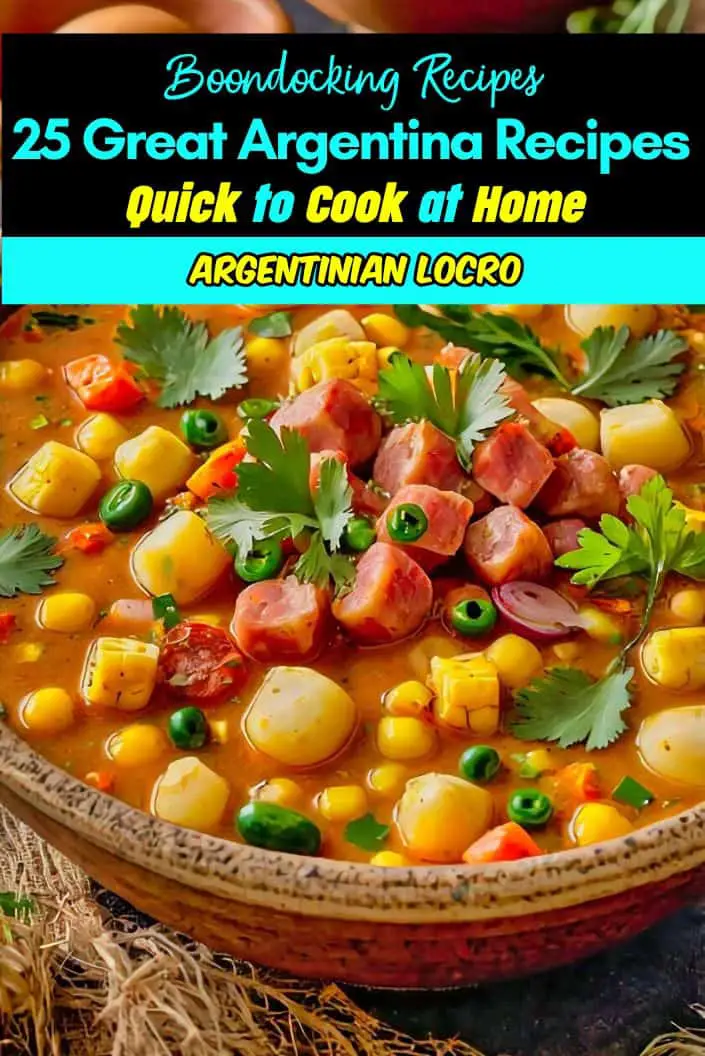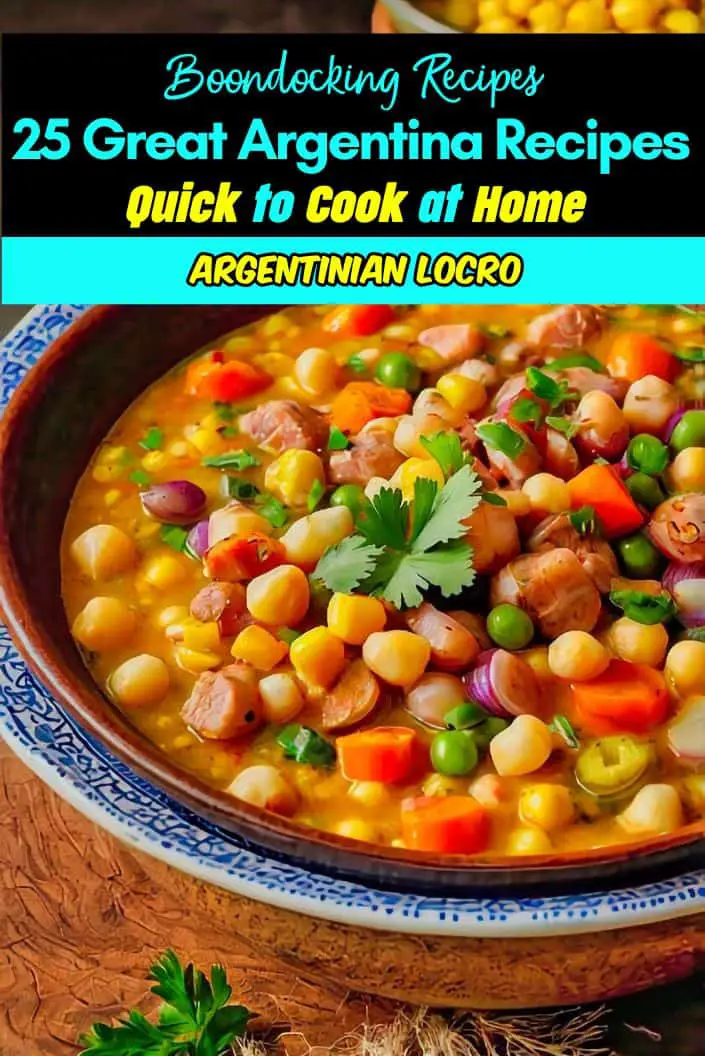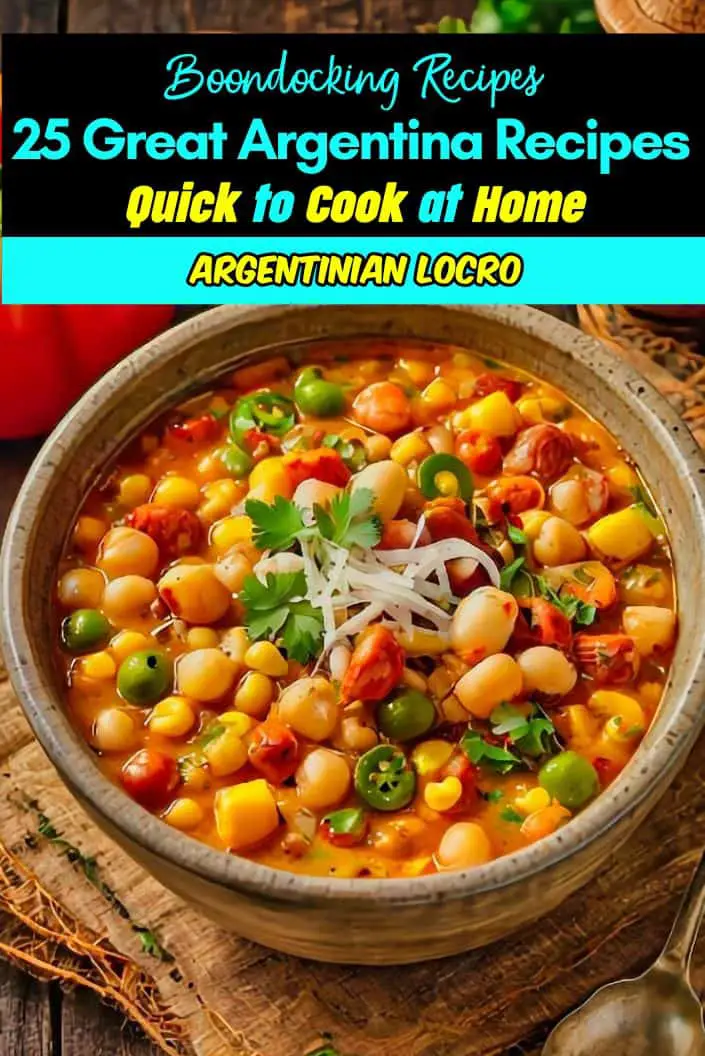Argentinian Locro is a traditional stew made with corn, beans, and various meats, often enjoyed during national celebrations. This hearty dish is typically served with a side of chipas or Argentine grilled provolone, making it a filling and comforting meal. The rich flavors of locro reflect the diverse culinary influences in Argentina, with each region adding its unique touch to the recipe. The addition of authentic chimichurri as a garnish adds a fresh, tangy contrast to the dish.
The Argentinian Locro was a standout dish during our visit to Argentina, known for its hearty and comforting nature. This traditional stew was presented in a large, steaming bowl, showcasing its rich, chunky texture. The Argentinian Locro featured a blend of beans, corn, and meat, all simmered to perfection. Its vibrant appearance, with hearty pieces of meat and vibrant vegetables, made it both visually appealing and inviting.
Sampling the Argentinian Locro revealed a robust taste that was both filling and satisfying. The combination of ingredients created a rich, comforting stew that highlighted the dish’s traditional roots. The balance of textures, from tender meat to soft beans and corn, offered a satisfying eating experience, and each bite of the Argentinian Locro was a testament to its well-loved status in Argentinian cuisine.
Overall, the Argentinian Locro was a memorable part of our food journey in Argentina. Its hearty presentation and rich taste provided a wonderful example of traditional Argentinian comfort food. The dish’s ability to bring together simple ingredients into a deeply satisfying meal made it a highlight of our culinary experiences.

Ingredients For the Argentinian Locro Recipe
Dried White Corn Kernels (hominy)
Beef Brisket
Pork Shoulder
Onion
Garlic Cloves
Red Bell Pepper
Paprika
Ground Cumin
Dried Oregano
Bay leaves
Chorizo Sausages
White Beans
Salt
Pepper
Water or Beef Broth
Cooking Instructions For the Argentinian Locro Recipe
- Soak the dried corn kernels in water overnight.
- In a large pot or Dutch oven, brown the beef and pork over medium-high heat. Remove from the pot and set aside.
- In the same pot, sauté the onion, garlic, and red bell pepper until soft and fragrant.
- Add the paprika, cumin, and oregano and cook for another minute, stirring constantly.
- Add the beef and pork back to the pot and add enough water or beef broth to cover the meat by about 2 inches.
- Add the soaked corn kernels, bay leaves, and chorizo sausages to the pot.
- Bring the mixture to a boil and then reduce the heat to low. Simmer for about 2 hours, stirring occasionally and adding more water or broth as needed to keep the ingredients covered.
- After 2 hours, add the white beans and continue to simmer for another 30 minutes.
- Remove the bay leaves and season with salt and pepper to taste.

5 Reasons to Love Argentine Red Shrimp Recipes
1. Rich Grilling Tradition
Reason: The art of grilling, or asado, is deeply ingrained in Argentinian culture. The emphasis on high-quality beef and simple seasoning lets the natural flavors shine, making each bite satisfying.
2. Diverse Flavors
Reason: Argentinian cuisine offers a wide variety of flavors, from the tangy chimichurri sauce to the sweet richness of dulce de leche. This diversity means there’s always something new and exciting to taste.
3. Family Atmosphere
Reason: Every dish in Argentina tells a story, reflecting the country’s history and cultural influences. Whether it’s a traditional empanada or a comforting bowl of locro, each meal connects you to the country’s vibrant heritage.
4. Fresh, Local Ingredients
Reason: Argentinian food emphasizes fresh, local ingredients, from the beef to the vegetables used in salads. This focus on quality ensures that each dish is flavorful and nourishing.
5. Community and Family
Reason: Meals in Argentina are more than just about food; they are a way to bring people together. The communal experience of sharing an asado or a family dinner creates strong bonds and lasting memories.
10 Tips for Cooking Traditional Argentinian Recipes
1. Select the Best Beef Cuts
Tip: Choose cuts like ribeye, sirloin, or flank for traditional Argentinian dishes. Look for well-marbled meat for optimal flavor.
Why: The quality of the beef is crucial in Argentinian cuisine, where grilling (asado) is central. Well-marbled meat ensures tenderness and juiciness.
2. Use Hardwood Charcoal for Grilling
Tip: Opt for hardwood charcoal instead of briquettes when grilling. It burns hotter and imparts a smoky flavor to the meat.
Why: The type of charcoal used can significantly affect the taste of grilled dishes, a key element in Argentinian cooking.
3. Marinate with Simple Ingredients
Tip: Use basic marinades of olive oil, garlic, lemon, and fresh herbs for meats. Avoid overpowering the natural flavor of the meat.
Why: Argentinian cuisine values the natural taste of ingredients. Simple marinades enhance the flavor without overwhelming it.
4. Cook Empanadas with a Golden Crust
Tip: Brush empanadas with an egg wash before baking to achieve a golden, crispy crust.
Why: A golden crust not only improves the texture but also adds an appealing visual aspect, making the empanadas more appetizing.
5. Serve Chimichurri as a Condiment
Tip: Prepare chimichurri using fresh parsley, garlic, oregano, vinegar, and olive oil. Serve it alongside grilled meats.
Why: Chimichurri is a staple in Argentinian cuisine, complementing the rich flavors of grilled meats with its tangy and herbaceous profile.
6. Cook Milanesa to a Crispy Perfection
Tip: Fry breaded beef or chicken cutlets in hot oil until golden brown. Drain on paper towels to remove excess oil.
Why: The crispiness of Milanesa is key to its appeal. Proper frying ensures a crunchy exterior while keeping the meat tender inside.
7. Prepare Locro for a Hearty Meal
Tip: Slow-cook a mix of corn, beans, pork, and chorizo for several hours. Season with paprika, cumin, and bay leaves.
Why: Locro is a traditional stew enjoyed during national celebrations, and its long cooking time allows the flavors to meld together, creating a rich and hearty dish.
8. Use Fresh Ingredients for Salads
Tip: Include fresh tomatoes, lettuce, onions, and boiled eggs in salads. Dress with olive oil, vinegar, and salt.
Why: Fresh ingredients are essential in Argentinian salads, providing a crisp and refreshing contrast to heavier meat dishes.
9. Achieve the Perfect Dulce de Leche Consistency
Tip: Cook sweetened condensed milk slowly, stirring frequently until it thickens and turns a caramel color.
Why: Dulce de leche is a beloved dessert component in Argentina. Its smooth, rich texture enhances pastries and sweets like alfajores.
10. Serve Wine to Complement the Meal
Tip: Pair Argentinian dishes with Malbec wine, known for its deep flavor and smooth finish.
Why: Wine is a vital part of Argentinian dining culture. A well-chosen wine enhances the dining experience by complementing the flavors of the food.
5 FAQ For the Argentinian Locro Recipe
Here are 5 FAQs using the keyword “Argentinian locro”:
Q: What is Argentinian locro?
A: Argentinian locro is a traditional stew made with ingredients like corn, beans, potatoes, and different meats, often served on national holidays in Argentina.
Q: How do you make Argentinian locro?
A: To make Argentinian locro, you cook corn, beans, potatoes, and various meats such as pork or beef together with spices like paprika and cumin until it becomes a thick, hearty stew.
Q: What meats are typically used in Argentinian locro?
A: Argentinian locro commonly uses meats like pork, beef, and sausage, which add rich flavors to the stew and make it a filling meal.
Q: When is Argentinian locro traditionally eaten?
A: Argentinian locro is traditionally eaten on national holidays such as May 25 and July 9, celebrating Argentina’s Independence Day with this comforting and symbolic dish.
Q: Can you make a vegetarian version of Argentinian locro?
A: Yes, you can make a vegetarian version of Argentinian locro by omitting the meat and adding more vegetables like squash and beans, while still using spices to maintain its rich flavor.

Argentinian Locro
Ingredients
- 1 lb. dried white corn kernels (hominy)
- 1 lb. beef brisket, cubed
- 1 lb. pork shoulder, cubed
- 1 large onion, chopped
- 3 garlic cloves, minced
- 1 red bell pepper, chopped
- 2 tbsp. paprika
- 2 tsp ground cumin
- 1 tsp dried oregano
- 2 bay leaves
- 2 chorizo sausages, sliced
- 1 15 oz. can white beans, drained and rinsed
- Salt and pepper to taste
- Water or beef broth, as needed
Equipment
- Large pot or Dutch oven
- Knife and cutting board
- Wooden spoon or spatula
- Measuring cups and spoons
Instructions
- Soak the dried corn kernels in water overnight.
- In a large pot or Dutch oven, brown the beef and pork over medium-high heat. Remove from the pot and set aside.
- In the same pot, sauté the onion, garlic, and red bell pepper until soft and fragrant.
- Add the paprika, cumin, and oregano and cook for another minute, stirring constantly.
- Add the beef and pork back to the pot and add enough water or beef broth to cover the meat by about 2 inches.
- Add the soaked corn kernels, bay leaves, and chorizo sausages to the pot.
- Bring the mixture to a boil and then reduce the heat to low. Simmer for about 2 hours, stirring occasionally and adding more water or broth as needed to keep the ingredients covered.
- After 2 hours, add the white beans and continue to simmer for another 30 minutes.
- Remove the bay leaves and season with salt and pepper to taste.



1 comment
Nice stew for cold days/
Comments are closed.